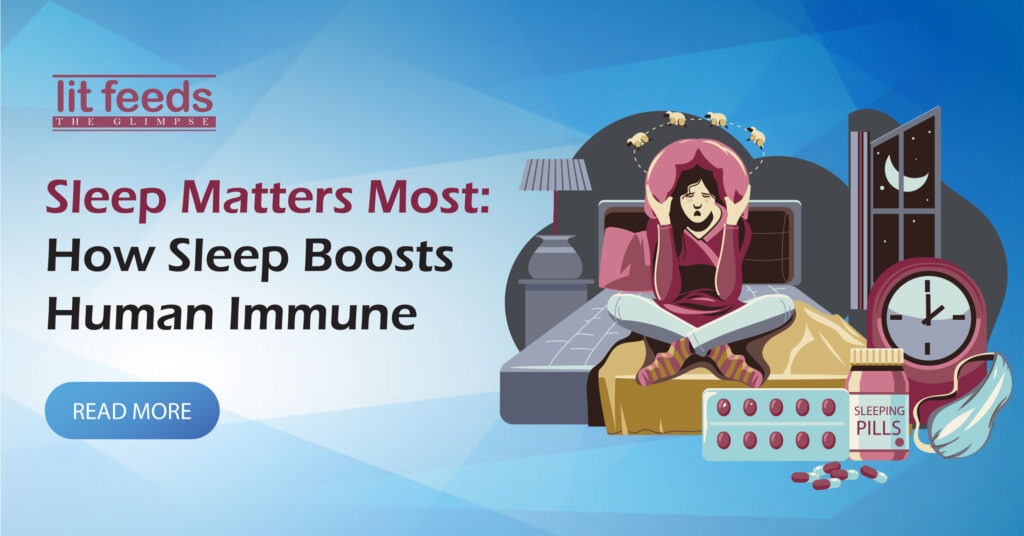
Sleep and why it matters:
We all know sleep matters a lot & sleep plays a major role in human lives around the world; this topic affects all of us because we know that without sleep our bodies and minds are not at their best, so we need more sleep in our lives.
Sleep is nothing but the body and mind taking a break to rest and recharge, The natural resting state of sleep allows the body and mind to recover on both a physical and mental level by providing a respite from awake.
Effects of Lack of sleep and why sleep matters most :
Lack of sleep is the one thing that alters how our bodies develop, and if it persists and is not addressed, it might be quite hazardous. One possible method that has come to light is the immune system.
Here will discuss the research that links sleep deprivation to changes in the innate and acquired immune systems, as well as studies that link sleep to accelerated aging of the immune system.
A huge amount of stress will lead to this lack of sleep as per the research. Psychological stress also affects the immune system function very badly, research has been done on this and reviewed along with the connection between stress and sleep.
How this psychological process affects immunity, the same data is available to demonstrate the connection between sleep stress and immunity.
Here are some positive aspects of getting nights restful sleep:
- Sleep plays a major role in human health; it is essential for overall health and well-being, so prioritizing your sleep is very important.
- Types of sleep vary getting quality and deep sleep is vital for many cognitive processes such as decision-making, thinking, high IQ, and solutions for problems, A well-rested mind is more alert and efficient. enhanced mood.
- During the process of emotional well-being, getting sufficient sleep is very important in everyone’s life, it reduces dizziness during the daytime, it reduces irritability, and develops mood disorders.
- Quality sleep is linked to improved concentration and productivity. A rested mind is better able to focus on tasks, leading to increased efficiency. Immune system support.
- For every human being sleep is very much vital. Adequate rest helps the body produce immune cells and proteins, reducing the risk of illness. Physical health and recovery.
—————————————————————————————————
What happens to the immune system when you get enough sleep:
- Sleep is vital, Sufficient rest for the human body helps the immune system and helps in body resistance, this is the time when the body produces some immune cells and proteins.
- A lack of sleep is one of the factors that contribute to obesity and overstress, whereas getting sleep always keeps the body active throughout the day, regulates hunger, and strengthens the immune system.
- As we always know sleep plays a major role in human lives, sufficient rest always helps the body produce some resistance cells and proteins that the body needs, which reduces the reduction of risk of illness.
- For physical health and recovery, sleep is very important. It helps with tissue and muscle healing as well as the body’s general upkeep. control of weight.
- People who get enough sleep feel alert, strong, and at ease. Their bodies can withstand stress and maintain cardiac health with great ease. Peaceful and Deep fully aid in the regulation of stress hormones.
- However poor sleep management has been associated with the risk of heart disease, hypertension, and stress-related issues too.
Why is sleep more important? How many hours of sleep we need.
Many factors including age, actually influence how much sleep an individual needs. Where infants (ages 0-3 months need a minimum of 14-17 hours a day.
Infants (4-11mnths need at least 15 hours a day Then toddlers need at least 11-12 hrs a day; once the infants and toddler stages are done, there will be differences in the sleep cycle; teenagers need 10 hours a day; adults need 7-9 hours a day, and older need 7-8 hrs a day.
But research says that if you feel dizzy; dowrzy during the day that means you haven’t had enough before the day which means sleep dept. In sleep cycle terms.
Infants between the ages of 0 and 3 months require at least 14 to 17 hours each day, (4–11 months) require at least 15 hours each day.
After that, toddlers need at least 11–12 hours a day; there will be changes in the sleep cycle for teens, adults, and older people, who need 7-8 hours a day, 7-9 hours for teens, and 10 hours for toddlers.
However, studies indicate that if you have lightheadedness or insomnia throughout the day, it’s likely a result of inadequate sleep the night before. that’s why sleep matters most.
Here are some tips for Improving your sleep:
Always maintain a consistent sleep schedule and stick to that schedule only, if you go the bed at the same time during the night and wake up at the same time; this regulates the internal clock of the body and can improve the quality of the sleep.
Creating a calm and soothing environment during your bedtime; activities like a warm bath, reading books, listening to the calm playlist you like, and meditation can also improve the sleep quality.
Avoiding caffeine and avoiding alcohol close to bedtime can also help in getting better quality sleep during the night.
Keeping your bedroom calm cool dark and quiet and comfortable beddings, pillows can also help in improving sleep cycle.
To Sum Up Why Sleep Matters Most:
Since 2008, the 13th of March has been designated as World Sleep Day to raise awareness of the value of quality sleep and why sleep matters most ? and to promote appropriate education in areas with inadequate sleep hygiene.
According to the survey, 93% of Indians are sleep deprived, severe lifestyle changes; use of modern gadgets; use of laptops; night shift jobs and using cellphones till midnight causing insomnia problems in the young generation, Thats why getting enough sleep matter.
When you get enough sleep, your body will be active and resistant to any conditions during the day. to achieve this, one must maintain a consistent sleep schedule, some breaks, rest times, practicing power naps, and relaxation techniques when needed.
Setting priorities for sleep cycle is nothing more than an investment in overall wellness and a balanced lifestyle. Not getting enough sleep might raise the risk of anxiety, depression, and stress.

















Pingback: How common is Irritable Bowel Syndrome IBS in Indians: - LitFeeds
Pingback: Understanding the use of medications & It’s side effects: - LitFeeds
Thanks for shering. Love it
93% of Indians are sleep deprived in india ? Really ??
Pingback: Understanding Child Psychology: Perfect Parenting Tips to Try Out Today! - LitFeeds